Research and Policy
Find here the latest resources and policy developments related to individual pupil mobility and the recognition of its learning outcomes
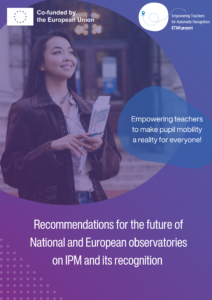
Recommendations for the future of National and European observatories on IPM and its recognition
Based on the experience of the ETAR project in the creation of Knowledge and Stakeholder Hubs, the project partners put forward a set of recommendations for the promotion of the model of K&S Hubs in different EU countries, and the sustainability of the national and European ones already created. Find the complete recommendation report here.
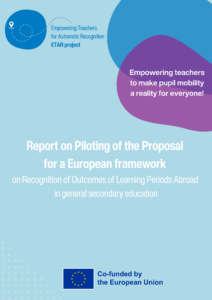
Report on Piloting of the Proposal for a European Framework on Recognition of Outcomes of Learning Periods Abroad
In general secondary education
The framework outlines five principles for automatic mutual recognition of the learning outcomes of study periods abroad for general upper secondary pupils. Learn more by reading the full report: here.
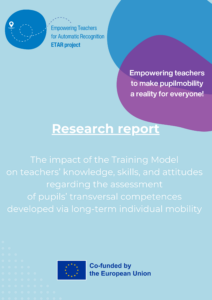
Research report on the Pilot of the Training Model
The Impact of the Training Model on Teachers’ Knowledge, Skills, and Attitudes Regarding the Assessment of Pupils’ Transversal Competences Developed via Long-term Individual Mobility
This research report, authored by Marta Kowalczuk-Walędziak (University of Białystok) in collaboration with Elisa Briga (EFIL) and Mattia Baiutti (Fondazione Intercultura), explores the effectiveness of a training model designed to enhance teachers’ ability to assess transversal competences in students participating in long-term mobility programs. You can read the full report here.
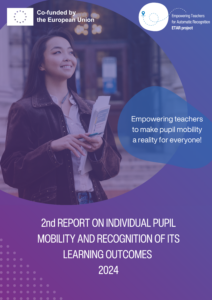
2nd Report on Individual Pupil Mobility and recognition of its learning outcomes – 2024
The Second Report on IPM and Recognition has been published!
Discover the latest initiatives aimed at enhancing access to IPM and learning outcome recognition within the European Education Area by 2025. The report outlines the current state of IPM, progress in recognizing learning achievements, and updates on implementing the proposed European framework for recognizing learning periods abroad in general upper secondary education. Read the full report here.
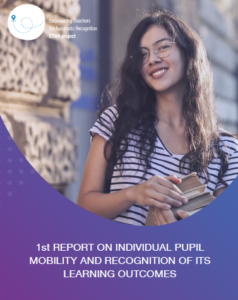
1st Report on Individual Pupil Mobility and recognition of its learning outcomes – 2023
The 1st Report on Individual Pupil Mobility and Recognition of its Learning Outcomes is out!
Learn more about the initiatives to support an improved access to IPM and recognition within the European Education Area by 2025, the current state of IPM and recognition of its learning outcomes, and the progress toward the implementation of the Proposal for a European framework on Recognition of Outcomes of Learning Periods Abroad in General Upper Secondary Education. You can find the full report here.
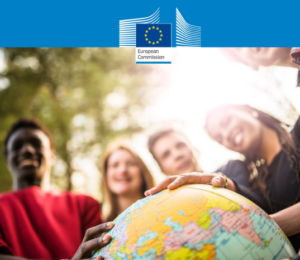
GO INTERNATIONAL
A practical guide for the internationalisation of schools, VET and adult education providers
This guide, published by the European Commission in 2024, provides practical guidance and advice to educational providers for the strategic planning of their international cooperation. It caters for both small and large institutions and for countries and educational systems at different stages of internationalisation. It builds first and foremost on EU cooperation, but also takes global aspects into account. You can consult the full guide here.

Proceedings of the Forum on ICL and Exchange – 2023
What changes does exchange spur on? Does exchange make pupils more active in society? Can it build intercultural solidarity? Do pupils experience a change in values as a result of learning mobilities?![]() You can find the answer to these questions and more in the report of the 12th FILE! The 12th edition took place in November 2023, bringing together 40 experts, researchers and practitioners of international youth exchanges and intercultural learning to explore the theme “Linking Values and Behaviours: Shaping active global citizens through pupils’ mobility”. Find all the information on the Trimestrale Intercultura No 113/2024.
You can find the answer to these questions and more in the report of the 12th FILE! The 12th edition took place in November 2023, bringing together 40 experts, researchers and practitioners of international youth exchanges and intercultural learning to explore the theme “Linking Values and Behaviours: Shaping active global citizens through pupils’ mobility”. Find all the information on the Trimestrale Intercultura No 113/2024.

International pupil mobility in secondary schools: which variables are most closely associated with the development of intercultural competence?
Mobility is one of the key actions within the process of internationalising school education to develop interculturally competent pupils. The study at the heart of this paper – Developing Intercultural Competence Through Adolescents’ Mobility (DICTAM) – seeks to explore which programme design features and individual characteristics are most closely associated with the development of intercultural competence. To reach this goal, a longitudinal study (using open-ended questionnaires and the Intercultural Development Inventory) was conducted with 378 pupils from Italian secondary schools who participated in a mobility programme. Find the article by Mattia Baiutti, Darla K. Deardorff & Roberto Ruffino (2024), here.
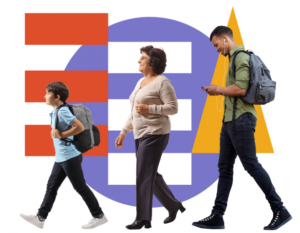
European Education Area by 2050
In 2020, the European Commission outlined its renewed vision for the European Education Area to be achieved by 2025, proposing new initiatives, more investment and stronger cooperation of Member States to help all Europeans, of all ages, benefit from the EU’s rich education and training offer. In May 2023, the Council of the EU approved its resolution “The European Education Area: Looking to 2025 and beyond” reinforcing the need to remove remaining obstacles to mobility, including by achieving automatic mutual recognition.
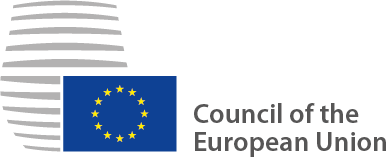
Council conclusions on further steps to make automatic mutual recognition in education and training a reality
In May 2023, the Council of Europe approved its conclusions on further steps to make automatic mutual recognition in education and training a reality. Building on the 2018 Council Recommendation on automatic recognition, it calls on Member States to continue taking steps to advance recognition and to develop relationships with relevant stakeholders.

Council Recommendation on automatic recognition (2018)
The Council Recommendation on promoting automatic mutual recognition of qualifications and learning periods abroad was adopted by the Council in 2018. With it, EU Member States made a political commitment to take steps to introduce automatic recognition by 2025, taking actions to build trust in each other’s education systems and to support Member States to improve recognition.
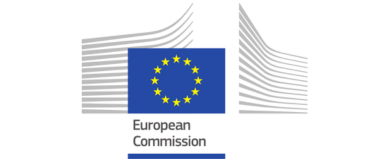
Evaluation Report of the Implementation of the 2018 Council Recommendation (2023)
The study on the implementation of the 2018 Council Recommendation on promoting automatic mutual recognition was developed by the European Commission in 2023. It provides an analysis of the state of play in the implementation of the Council Recommendation on promoting automatic mutual recognition adopted in 2018.

EFIL Reaction to the Council Recommendation “Europe on the Move”
The European Federation for Intercultural Learning – leading the collective of Individual Pupil Mobility stakeholders from across Europe gathered within the Erasmus+ project Empowering Teachers for Automatic Recognition -ETAR, welcomes the Europe on the Move Council recommendation, adopted on 14 May 2024. During the consultation process, EFIL called for the inclusion of three main principles in the Recommendation, and we can see them clearly addressed. You can find the full text of the joint reaction here.

EFIL’s endorsed reaction to ‘Europe on the Move” (March 2024)
The participants of the Conference on Individual Pupil Mobility and Recognition of its learning outcomes, coming from 17 countries and representing secondary school teachers, school heads, students, pupil mobility organisations, Erasmus+ National Agencies, Ministries of Education, Permanent Representations to the EU, Regional Authorities, European networks in the field of education, welcome the Proposal for a Council recommendation ‘Europe on the Move’, an essential step for making the European Education Area (EEA) a reality. You can read the full endorsed position paper of EFIL here.
Expert Network on Recognition of outcomes of learning periods abroad in general secondary education
In 2020-2021, the ‘Expert Network on Recognition of outcomes of learning periods abroad in general secondary school’, led by EFIL, worked to support the European Commission in helping Member states to advance automatic recognition. Find here all the outcomes from the project aimed at supporting policy-makers, education professionals, pupils and parents in advancing recognition across all EU countries.
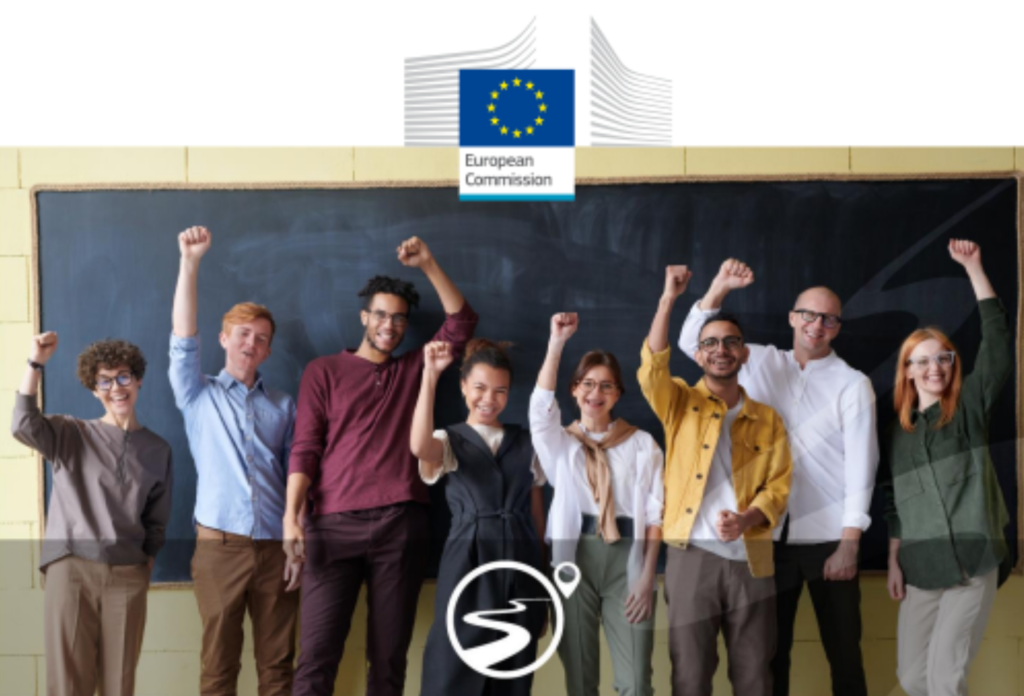
Proposal for a European Framework on automatic recognition
The Network of Experts developed a ‘proposal for a European Framework on recognition of outcomes of learning periods abroad in general upper secondary education‘ aimed at supporting the recognition of outcomes of learning periods among States, setting out general principles to then be adapted to the context of each Member State.

Analysis of recognition procedures across EU Member States
The Member states analysis sets out current recognition processes in the 27 EU Member States regarding general upper secondary education in light of the Council recommendation adopted in 2018. It identifies barriers and enablers to automatic mutual recognition and suggest potential ways forward at both European and national levels.

Training Model on Assessment of Transversal Competences
This Training model was created with the aim of supporting school heads and teachers in assessing transversal competences developed by pupils taking part in individual mobility. The objective is to recognise and value the development of transversal competences as a central dimension of pupil mobility.
Check the Knowledge and Stakeholder hubs at national level
Find the latest resources and policy developments at national level in Belgium [flanders], Poland and Estonia


